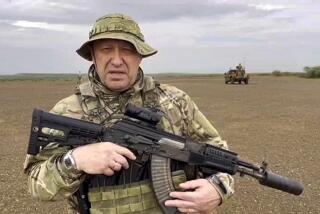In Russia, the Empire Strikes Back
- Share via
MOSCOW — When the Soviet Union broke apart two years ago, Russia’s idea of itself as an empire refused to die.
Russian chauvinists kicked up a storm of protest as upstart republics like Azerbaijan, the Baltics and Ukraine not only shed the Soviet hammer and sickle but spun far beyond Moscow’s orbit, building their own defenses, printing their own currencies and seeking new allies elsewhere.
Who “lost” those outposts of a millennium-old, multiethnic empire was a dagger-pointed question raised by Communists and radical nationalists in their long struggle and bloody showdown with President Boris N. Yeltsin for control of democratic Russia.
But in the weeks before and since crushing his rivals with an Oct. 4 assault by troops and tanks on the Parliament, Yeltsin has achieved a less visible although equally dramatic turn in regional politics--a parade of supplicants from the periphery, humbled by ethnic strife and economic disarray, pleading for Moscow’s help.
“Nobody should doubt that the mentality and reflexes of Russian imperialism are still alive,” said Georgia’s Eduard A. Shevardnadze, the latest leader to swallow a nation’s pride and surrender its fate to the Kremlin.
In recent days, at Shevardnadze’s reluctant urging, the Russian military has intervened in Georgia’s civil war--handing over some tanks, parking warships off the Black Sea coast, sending 200 marines ashore to guard a port and a threatened railroad--just enough to turn a rebel offensive into a retreat.
Russia acted only after Shevardnadze’s Parliament endorsed his decision to take Georgia into the Commonwealth of Independent States, the loose alliance of 11 other former Soviet republics that is run from Moscow.
The Commonwealth had gained a new partner Sept. 24 after a similar about-face in Azerbaijan. Frustrated by defeats in a war against Armenians, an Azerbaijani warlord, flush with extra weapons from a local Russian base, overthrew a president who had embraced Turkey as a regional big brother. He was replaced by a pragmatic veteran of the Soviet Politburo, Geidar Aliyev, who traveled here to ask Yeltsin to help stop the fighting.
Just as remarkable was a Sept. 3 agreement by Ukraine, the most militarily powerful and independent of the former Soviet republics after Russia, to sell its half of the prized Black Sea Fleet to the Russian navy in exchange for urgently needed debt relief.
And there was the Sept. 7 accord in which five nations--Armenia, Belarus, Kazakhstan, Tajikistan and Uzbekistan--pledged to give Russia’s Central Bank control of their fiscal and monetary policies as the price for using the Russian ruble as their currency.
All these concessions add up to a grudging recognition of Moscow’s military and financial clout as Russia’s neighbors come to terms with their own weaknesses and with the reluctance of outsiders--such as the United States, Turkey and the European Community--to compete as a patron.
But the realignment toward Moscow also results from an increasingly active assertion of Russia’s power as the Yeltsin government tries to redefine an empire without Soviet-style dictatorship or central-command economics.
Last February, Yeltsin formally staked Moscow’s claim to “special powers as a guarantor of peace and stability” in the former Soviet periphery that Russians call the “near abroad.”
By that time, former Soviet troops under Russian command had already intervened in three conflicts beyond Russia’s borders: in Moldova, on behalf of Russian-speaking secessionists; in Tajikistan, to prop up a repressive, neo-Communist regime against Islamic-led guerrillas, and in Georgia, to help ethnic separatists drive Shevardnadze’s army from the Black Sea province of Abkhazia.
Last week, Russia unveiled a new military doctrine justifying such use of its troops beyond its borders. Defense Minister Pavel S. Grachev, outlining the policy, cast doubt on Yeltsin’s commitment to withdraw Russian forces from Estonia and Latvia, saying they should stay as long as needed to protect the rights of Russian minorities there.
Russia has also unsheathed its oil weapon. It continues to charge low Soviet-era prices to republics willing to build a common market on the ruins of the former union, while raising prices for--or threatening to cut off--those that are not. Only Turkmenistan, rich in natural gas, and the Baltic nations, with improving economies and special ties to Europe, seem consistently able to go their own way.
What is left is an “empire” that works somewhat like the United States and its own traditional back yard, Central America: Through economic and military pressure, the big neighboring country favors compliant local leaders and reins in radical nationalists, sometimes forcing them from power.
“Who said the current isolation of the former Soviet republics from each other is the way things will always be?” Yeltsin adviser Sergei B. Stankevich asked in a recent interview with Russia’s New Economic Gazette. “A gradual replacement of the leadership is under way: Those who bet on complete sovereignty and independence are vacating their seats.
“I don’t mean that the (Soviet) Union should be restored,” he added. “But a process of bridging gaps is clearly visible. Russia’s historical task is the gradual cultural and economic expansion into the new foreign countries.”
The neo-imperial agenda in Moscow raises alarm inside and outside Russia. Some contend that Moscow’s strong-armed methods create more conflict than they prevent, and they urge the West to intervene. Others say Russia cannot afford an empire, that trying to keep one will weaken its free-market reforms at home.
Yeltsin’s dependence on the army to put down the October revolt at home, the critics warn, can only weaken the Kremlin’s already scant civilian control over military adventurism in the “near abroad.” The new, more assertive military doctrine, which also rejects the longtime Soviet promise not to use nuclear weapons first, is one sign of the army’s stronger position.
“The military is basically the same Soviet military that lost the republics and wants them back,” said Sergei Rogov, a leading military analyst who heads Russia’s Center for National Security Problems and International Relations. “Yeltsin has practically given them carte blanche.”
Georgia’s bloodshed is a rallying point for those who don’t trust the Russian army with keeping peace. The 13-month war in Abkhazia claimed 3,000 lives, despite Moscow’s contentions that Russian troops stationed there were neutral and trying to arrange a cease-fire.
In an interview with the Moscow News, Sergei Leonenko, a former Russian army lieutenant, described relations between Russian troops and the Abkhazian rebels as “brotherly.” Local Russian commanders aided the rebels with military planning, advice and “moral support,” he added, to punish Shevardnadze for his role in freeing Eastern Europe from Kremlin control when he was Soviet foreign minister in the late 1980s.
Shevardnadze’s pact with Russia to blunt the latest uprising, led by former Georgian President Zviad Gamsakhurdia, has raised howls of dissent from nationalists in Georgia, who believe the Russian army is simply trying to extend its control there.
“Georgia had no other choice because the West sold us out,” complained Alex Khaindrava, a retired English teacher in Tbilisi, the Georgian capital. “They wanted the Soviet Union broken up, but they don’t want to help us become stable democracies.”
The United States has privately criticized Russia’s behavior in Abkhazia and made it clear, as Secretary of State Warren Christopher said Thursday, “Russia must be part of the solution, not part of the problem with respect to regional conflicts.”
But U.S. officials admit that there is no other power ready or willing to take on the role of peacekeeping in hot spots like Georgia or Tajikistan. So Russian Foreign Minister Andrei V. Kozyrev gets the last word on this issue: “From those who do not want to share this burden,” he said, “let us hear no more about the danger of a new ‘Russian imperialism.’ ”
In Moscow, the nature of Russia’s “burden” in the region is not as clear as the rhetoric. Most Russian leaders and intellectuals agree on the need to protect the 25 million Russian citizens in the “near abroad” stabilize the volatile Caucasus republics of Armenia, Azerbaijan and Georgia, keep Islamic fundamentalists out of Central Asia and break down economic barriers thrown up by Ukraine and other neighbors.
But there are divisions within the government--echoed in Russia’s current election campaign--over how to achieve these goals. For example, some military officers prefer to control regional conflicts with rapid-deployment battalions; others want Russian troops based permanently in potential hot spots.
Within Yeltsin’s economic team is a sharpening feud between officials led by Prime Minister Viktor S. Chernomyrdin who want to expand trade through continued subsidies to the other republics and the Finance Ministry, which wants to stop the subsidies, which amounted to $17 billion last year.
Other reformers worry that Yeltsin, by assuming a military burden in war-torn places like Georgia and Tajikistan, will end up paying for their reconstruction. At home, the army is likely to slow the reformers’ plans to slash arms spending.
Times staff writer Doyle McManus in Washington contributed to this report.
More to Read
Sign up for Essential California
The most important California stories and recommendations in your inbox every morning.
You may occasionally receive promotional content from the Los Angeles Times.













